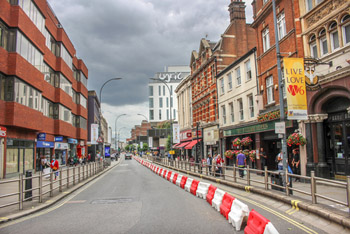Transport secretary Grant Shapps has come under fire after claiming that local authorities were ‘abusing’ cash for improving road layouts for pedestrians and cyclists.
However many of the measures he criticised appear very similar to interventions he told councils to make earlier this year.
Writing in The Telegraph, Mr Shapps did not specify which cash fund he was referring to, but said ministers had ‘asked local authorities to come up with schemes to help all types of road user’ – apparently a reference to the £250m Emergency Active Travel Fund (EATF) announced in May.

King Street, Hammersmith, July 2020
He wrote: ‘Some councils have introduced random one-way systems, which don’t seem to offer many benefits to anyone. Some of those plastic barriers that have gone up in town centres to widen the pavements can actually prevent pedestrians, including disabled people, crossing the road.
‘They narrow the carriageway for traffic, causing congestion and increasing danger for cyclists. They reduce parking for essential visits to the pharmacy or dentist or doctor. And they don’t seem to be much used by pedestrians either. So a number of them will be coming out soon. We’re also telling councils that now the height of the emergency has passed, there’s time to consult people more.’
In an apparent threat to withhold the approximately 80% of the cash that has yet to be formally allocated, he added: ‘Where some councils have abused the cash, my message is clear: speak to local residents, get it fixed or no more cash.’
Mr Shapps personally issued statutory guidance at the time the EATF was launched, requiring councils to 'reallocate road space to people walking and cycling'.
This included: ‘Installing pop-up cycle facilities with a minimum level of physical separation from volume traffic; for example, mandatory cycle lanes, using light segregation features such as flexible plastic wands; or quickly converting traffic lanes into temporary cycle lanes (suspending parking bays where necessary)’.
Mr Shapps also recommended: ‘Using cones and barriers: to widen footways along lengths of road, particularly outside shops and transport hubs; to provide more space at bus stops to allow people to queue and socially distance; to widen pedestrian refuges and crossings (both formal and informal) to enable people to cross roads safely and at a distance.’
Mr Shapps’ criticisms drew a sharp response from Green Party London Assembly Member Caroline Russell, who wrote on Twitter: ‘This is one U-turn the government shouldn’t make. By all means improve and tweak schemes but removing schemes without using alternatives will cut away space for walking and cycling when we still need it.’
A spokesperson for the Local Government Association said: ‘Councils have had to make rapid decisions in order to adapt to social distancing guidelines and support the surge in demand for cycling and walking options due to the pandemic.
‘They have tried to involve all parts of their communities as much as possible. Inevitably, not all schemes will be as successful as hoped and in some areas these are being altered or removed to reflect changing local circumstances or views.’
The RAC's head of roads policy, Nicholas Lyes, said some schemes are not working well, but suggested that Mr Shapps was at least partly to blame.
He said: 'The fact that the Government gave authorities just weeks to introduce schemes for the reallocation of road space is a reason why some schemes aren’t working. Councils were told they did not need to consult – yet if they didn’t take the cash on offer, they risked missing out on it altogether.'
Mr Shapps made a number of other questionable claims in his article, including claiming to have ‘fought for’ the £27bn allocation for the second Road Investment Strategy (RIS 2).
While a budget of £25bn for RIS 2 had been announced before he came to office last year, this did not include the costs of the A303 Stonehenge Tunnel or the roads for the Lower Thames Crossing, both of which were due to be publicly funded outside RIS 2 but were subsequently included in its list of schemes.
Mr Shapps also claimed that ‘green number plates will help make everyone aware that [numbers of electric vehicles] are growing exponentially’. In fact, in June his Department rowed back on plans for number plates with a green background in favour of a design with a small green strip at one end.